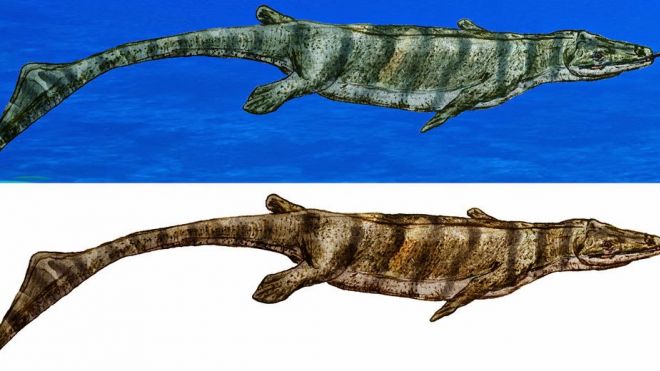A nearly complete fossil of a prehistoric marine reptile with preserved soft tissue has been found in central-western Colombia, at a spot several hundred miles from the Caribbean coast, a university in this capital said.
Experts have given the reptile the name “Eonatator coellensis” because the find was made in a dry stream bed in Coello, a town in Tolima province, the National University of Colombia’s news agency said Tuesday.Professor Luis Enrique Calderon and his son Ricardo discovered the fossil in rocks dating back 80 million years, during the Cretaceous period (145-66 million years ago), and informed the Colombian Geological Service.
The animal was a mosasaurus with a full body length of 2.8 meters (9.1 feet) and a head length of 41.5 centimeters (16 inches), according to experts from that institution, which said it was a member of the genus Eonatator.
Colombian paleontologist Maria Paramo, a National University professor who is heading up the investigation, discovered that the remains have a cream-pink coloration and have been almost entirely preserved with the exception of the tail.Her findings include 15 of the reptile’s teeth, its thoracic wall and part of its vertebral column.Based on the quantity, morphology and length of the preserved vertebrae, she estimates that the length of the animal’s tail was similar to that of the rest of its body.The soft tissue remains are located in the lungs and the pancreas, as well as the muscle fibers that extend to the ribs.
“One thing that troubled us was why the skin wasn’t preserved if what was inside was preserved,” the researcher said.
“From the geological characteristics, it’s apparent that it didn’t go frequently into the open sea, but rather stayed closer to the coast,” Paramo said.
“The anatomical shape of its front and hind limbs indicate it could have gone a little away from the mainland,” the paleontologist added.
Courtesy: Fox News



 February 20th, 2015
February 20th, 2015  Riffin
Riffin 
 Posted in
Posted in  Tags:
Tags: 